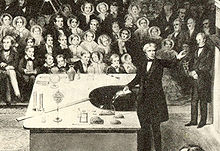
Back محاضرة عامة Arabic Yleisöluento Finnish Lecture publique French Kuliah umum ID 公開講座 Japanese Acroasis Latin
The examples and perspective in this article may not represent a worldwide view of the subject. (February 2014) |

A public lecture (also known as an open lecture) is one means employed for educating the public. Gresham College, in London, has been providing free public lectures since its founding in 1597 through the will of Sir Thomas Gresham. The Royal Society held its first ever meeting at Gresham College in November 1660, after one of Christopher Wren's lectures, and continued to meet there for the next fifty years.[1]
The Royal Institution of Great Britain has a long history of public lectures and demonstrations given by prominent experts in the field. In the 19th century, the popularity of the public lectures given by Sir Humphry Davy at the Royal Institution was so great that the volume of carriage traffic in Albemarle Street caused it to become the first one-way street in London. The Royal Institution's Christmas Lectures for young people are nowadays also shown on television. Alexander von Humboldt delivered a series of public lectures at the University of Berlin in the winter of 1827–1828, that formed the basis for his later work Kosmos.